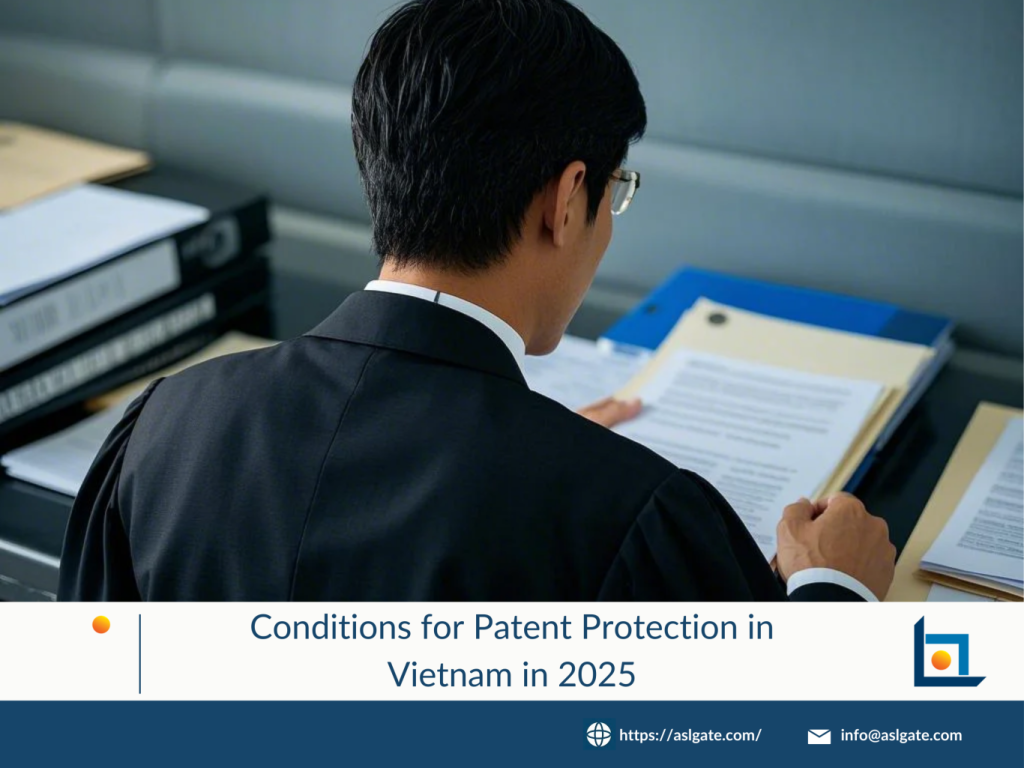Vietnam patents are one of the key subjects of intellectual property rights, playing a crucial role in promoting technological innovation and economic development. Under Vietnam’s 2025 legal framework, a patent must meet three fundamental conditions to be eligible for protection: (i) novelty, meaning it has not been publicly disclosed in any form before the filing date; (ii) inventive step, meaning it is not an obvious solution to a person of ordinary skill in the relevant field; and (iii) industrial applicability, meaning it can be manufactured or utilized in any industry.
Understanding these conditions will help businesses and inventors with filing Vietnam patent to maximize their legal rights to protect and commercialize their patents effectively.
General Conditions for Patent Protection
- An invention is protected by the Invention Patent if it meets the following conditions:
a) Novelty;
b) Inventive step;
c) Industrial applicability. - An invention is protected by the Utility Solution Patent if it is not common knowledge and meets the following conditions:
a) Novelty;
b) Industrial applicability.
Objects Not Eligible for Patent Protection
The following objects are not eligible for patent protection in Vietnam:
- Discoveries, scientific theories, and mathematical methods;
- Diagrams, plans, rules, and methods for performing mental activities, training animals, playing games, or conducting business; computer programs;
- Methods of presenting information;
- Solutions that are purely aesthetic in nature;
- Plant varieties and animal breeds;
- Biological processes for the production of plants or animals that are not microbiological processes;
- Methods of disease prevention, diagnosis, and treatment for humans and animals.
Novelty of an Invention
- An invention is considered novel unless it falls into one of the following cases:
a) It has been publicly disclosed in any form—through use, written descriptions, or any other means—domestically or internationally before the filing date or the priority date (if applicable).
b) It has been disclosed in another patent application with an earlier filing date or priority date but was published on or after the filing or priority date of the subject application. - An invention is considered undisclosed if only a limited number of individuals are aware of it and are obliged to maintain its confidentiality.
- An invention is not considered to have lost its novelty if it is disclosed by the person with the right to apply (as specified in Articles 86 and 86a of the Intellectual Property Law) or someone who obtained the information directly or indirectly from that person, provided that the patent application is filed in Vietnam within twelve months from the disclosure date.
- The provision in Clause 3 of Article 60 also applies to inventions disclosed in industrial property applications or protection titles published by the national industrial property authority if the disclosure was contrary to legal provisions or resulted from an unauthorized application.
Inventive Step of an Invention
- An invention is considered to have an inventive step if, based on publicly disclosed technical solutions—through use, written descriptions, or any other means—domestically or internationally before the filing date or priority date (if applicable), it represents a creative advancement that is not easily derived by a person of ordinary skill in the relevant technical field.
- A technical solution that has been disclosed under Clause 3 and Clause 4 of Article 60 of this Law shall not be used as a basis for evaluating the inventive step of the invention.
Industrial Applicability of an Invention
An invention is considered industrially applicable if it can be repeatedly implemented for manufacturing products, mass production, or repeated application of the process described in the invention while yielding consistent results.
ASL Law is a leading full-service and independent Vietnamese law firm made up of experienced and talented lawyers. ASL Law is ranked as the top tier Law Firm in Vietnam by Legal500, Asia Law, WTR, and Asia Business Law Journal. Based in both Hanoi and Ho Chi Minh City in Vietnam, the firm’s main purpose is to provide the most practical, efficient and lawful advice to its domestic and international clients. If we can be of assistance to how to register patent in Vietnam, please email to [email protected].
ASL LAW is the top-tier Vietnam law firm for Intellectual Property Services. If you need any advice, please contact us for further information or collaboration.

 Tiếng Việt
Tiếng Việt 中文 (中国)
中文 (中国) 日本語
日本語

